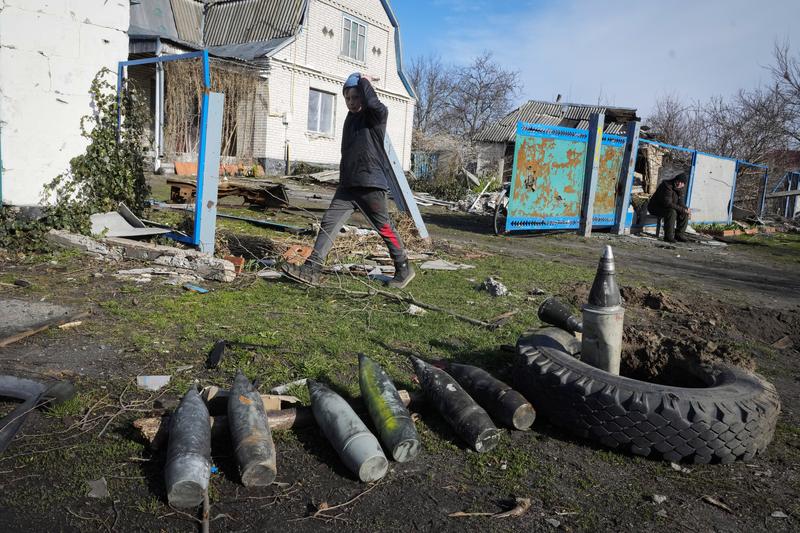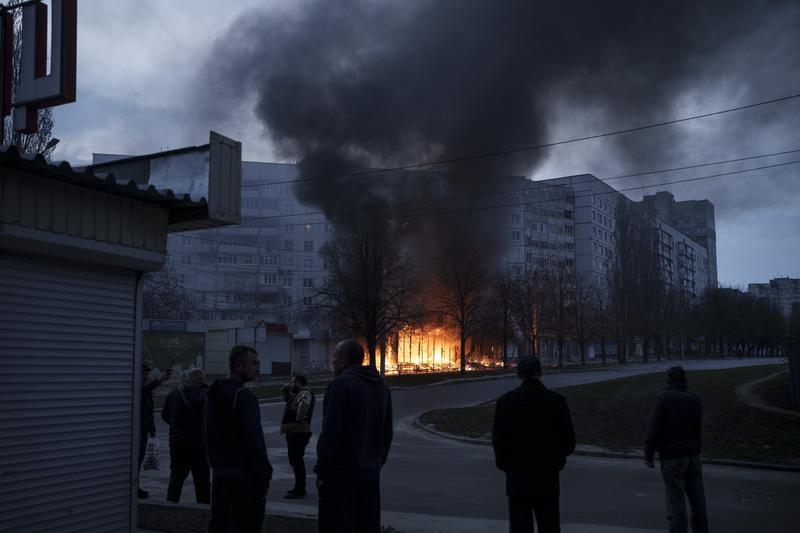 A boy walks by unexploded Russian shells in the village of Andriyivka close to Kyiv, Ukraine, April 11, 2022. (EFREM LUKATSKY / AP)
A boy walks by unexploded Russian shells in the village of Andriyivka close to Kyiv, Ukraine, April 11, 2022. (EFREM LUKATSKY / AP)
MOSCOW/KYIV/OTTAWA/PARIS/ BRUSSELS/ZAGREB – Russia's armed forces have destroyed air defense equipment supplied to Ukraine by a European country, the Russian Defense Ministry said Monday.
"On April 10, high-precision sea-based Kalibr missiles destroyed the equipment of an S-300 anti-aircraft missile division, which was supplied to Kiev by a European country," Russian Defense Ministry Spokesperson Igor Konashenkov told a daily briefing.
The equipment previously hidden in a hangar was destroyed on the southern outskirts of the eastern Ukrainian city of Dnipro.
Russia is continuing its special military operation in Ukraine. Total 129 aircraft and 99 helicopters, 243 anti-aircraft missile systems, 441 unmanned aerial vehicles, 2,079 tanks and other armored combat vehicles, 239 multiple launch rocket systems, 909 field artillery and mortars, as well as 2,003 units of special military vehicles have been destroyed to date.
Moscow for continuing talks with Ukraine
Despite Ukraine's inconsistency and tendency to reject its own proposals, Russia prefers to continue the negotiation process, said Russian Foreign Minister Sergei Lavrov during an interview with the Rossiya 24 broadcaster.
Moscow will be patient and persistent throughout the negotiations. But it will never play a subordinate role in the current world order, he said.
READ MORE: Ukraine crisis sparks new arms race
"Russia, with its history ... its traditions, is one of those countries that will never occupy a subordinate position. We can only be members of the international community on equal terms, under conditions (that guarantee) the indivisibility of security," Lavrov said, adding that these principles were agreed upon and then ignored by the West.
EU resumes diplomatic presence in Ukraine
The delegation of the European Union to Ukraine said on Monday it has resumed its work in Kyiv. "The EU is back in town," the diplomatic mission tweeted.
Stop blaming the sanctions. It is the Russian military causing food scarcity.
Josep Borrell, High Representative for Foreign Affairs and Security Policy, EU
The EU evacuated its delegation from Kyiv to the Polish city of Rzeszow shortly after the conflict between Russia and Ukraine started on Feb 24.
European Commission President Ursula von der Leyen and the EU foreign policy chief Josep Borrell visited Ukraine last week, promising a speedier process for the country to join the EU.
New Canadian sanctions on Russia
Canada on Monday announced new measures imposing restrictions on 33 entities in the Russian defense sector.
The entities have provided indirect or direct support to the Russian military, according to foreign ministry news release.
Since the start of the Russia-Ukraine conflict, Canada has imposed sanctions on more than 700 individuals and entities from Russia, Ukraine and Belarus.
France declares 6 Russian diplomats personae non gratae
France on Monday declared "six Russian agents operating under diplomatic cover" personae non gratae.
After an investigation made by the General Directorate of Internal Security (DGSI) on Sunday, the six Russian agents "whose activities were revealed contrary to our national interest have been declared persona non grata”, the French Ministry for Europe and Foreign Affairs said in a press release.
Russia’s foreign ministry has said Moscow will respond to the expulsion of diplomats from France, according to media reports.
WB: Ukraine's economy to shrink by 45.1%
Ukraine's gross domestic product will shrink by 45.1 percent this year due to the conflict with Russia, the Interfax-Ukraine news agency reported on Monday, citing a recent World Bank report.
Projecting that the poverty rate in Ukraine will increase from 1.8 percent in 2021 to 19.8 percent in 2022, the WB said private consumption this year will fall by 50 percent, exports will decrease by 80 percent, while imports will shrink by 70 percent.
In 2023, the Ukrainian economy is expected to rise by 2.1 percent, down from the previous projection of 3.5 percent, the WB said.
EU fails to decide on sanctions against Russian oil
EU foreign ministers did not decide on sanctions targeting Russia's oil and gas, EU's High Representative for Foreign Affairs and Security Policy Josep Borrell said on Monday.
Addressing the media following a meeting of the EU's foreign ministers in Luxembourg, Borrell said that although no decision was taken, "nothing is off the table, including sanctions on oil and gas." Last year, the bill for oil was four times that of gas "so it is important to start with oil."
The sanctions would cause an "asymmetric shock" between EU countries since central and eastern European member states are "heavily dependent" on Russian energy imports, he said.
ALSO READ: Proxy war takes big toll in Ukraine
Rejecting Russian officials' claims that the growing food shortage is due to sanctions on Russia, he accused the country of "provoking hunger in the world”.
"Stop blaming the sanctions. It is the Russian military causing food scarcity," he said, adding that there is a "big number of ships" carrying agricultural exports that cannot leave Ukrainian ports.
 Residents stand outside their apartments as shops burn after a Russian attack in Kharkiv, Ukraine, Monday, April 11, 2022. (FELIPE DANA / AP)
Residents stand outside their apartments as shops burn after a Russian attack in Kharkiv, Ukraine, Monday, April 11, 2022. (FELIPE DANA / AP)
Putin talks with Austrian chancellor
The Kremlin said Monday that Russian President Vladimir Putin's meeting with Austrian Chancellor Karl Nehammer was "short according to current standards."
The meeting reportedly lasted 90 minutes.
Asked to comment on the statement of the Austrian chancellor about lack of optimism after the meeting, Kremlin spokesman Dmitry Peskov said he is unaware of the results of the negotiations, Russia's RIA Novosti reported.
READ MORE: 'Russia-Ukraine conflict to affect 25% of global grain market'
Nehammer said in a statement later that it was "very direct, open and tough."
Croatian expels Russian diplomats
The Russian Embassy in Croatia said on Monday that Croatia's decision to expel 18 Russian diplomats and six members of administrative and technical staff is "a significant step backward in bilateral relations."
"This decision is a significant step backward in bilateral relations, counterproductive for Russian-Croatian cooperation ahead of the 30th anniversary of the establishment of diplomatic relations between our two countries," Russian Ambassador to Croatia Andrey Nesterenko said in a statement.
Moscow also reacted to this decision. "Russia will respond appropriately," Russian Foreign Ministry spokeswoman Maria Zakharova told Russia's TASS news agency.


